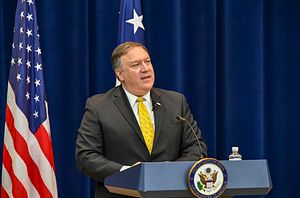U.S. Secretary of State Mike Pompeo arrives in Pakistan on Wednesday for talks with the country’s new government, led by Prime Minister Imran Khan of the Pakistan Tehreek-e-Insaaf party. Khan, a populist with an anti-American streak, become prime minister after the controversial July 25 elections in Pakistan.
Days before Pompeo’s scheduled trip, the U.S. Department of Defense announced a final decision on the suspension of a $300 million tranche of Coalition Support Fund (CSF) reimbursements for Pakistan, which had been announced earlier this year by the Trump administration.
“Due to a lack of Pakistani decisive actions in support of the South Asia Strategy the remaining $300 million was reprogrammed,” a Pentagon spokesperson told Reuters. CSF payments reimburse Pakistan for expenses incurred combating terrorism on its own soil.
“We certainly haven’t seen the progress that we would have hoped to have seen,” Pompeo told reporters on his flight to Pakistan. “Certainly not progress that would be sufficient for us to have advocated for turning back on that financial support.”
“Look, this wasn’t news to the Pakistanis,’’ Pompeo said. “The rationale for them not getting the money is very clear, it’s that we haven’t seen the progress that we need to see from them and the very reason for this trip is to try to articulate what it is our expectation is. We need Pakistan to seriously engage to help us get to the reconciliation we need in Afghanistan.”
The move built leverage for Pompeo prior to his arrival. The U.S. secretary of state is unlikely to have a relaxed time in Islamabad as he meets with his counterpart and other officials in Khan’s government. Referencing the new government’s ascendance, Pompeo said he sought a “reset” in U.S.-Pakistan ties.
In the days leading up to his trip, the U.S. State Department entered a tiff with Khan’s young government after an official readout of a phone call between Pompeo and Khan made reference to the issue of terrorists on Pakistani soil.
Pompeo “raised the importance of Pakistan taking decisive action against all terrorists operating in Pakistan,” the U.S. readout had noted. Pakistan strongly protested and insisted that the issue had not been brought up.
U.S.-Pakistan relations have been strained since the start of 2018. Shortly after the new year, U.S. President Donald J. Trump took to Twitter to issue a strong condemnation of Pakistan. “The United States has foolishly given Pakistan more than 33 billion dollars in aid over the last 15 years, and they have given us nothing but lies & deceit, thinking of our leaders as fools,” Trump said.
“They give safe haven to the terrorists we hunt in Afghanistan, with little help. No more!” Trump’s tweets were followed by aid suspensions totaling more than $900 million. The CSF reimbursements are a portion of that sum, with the rest coming from Foreign Military Financing earmarks, which fund purchases of U.S. military hardware by third countries.
After his time in Pakistan, Pompeo will travel to India, where he will join his counterpart from the U.S. Department of Defense Jim Mattis for the first-ever U.S.-India ‘two-plus-two’ consultations, which will bring the two of them together with their Indian counterparts, External Affairs Minister Sushma Swaraj and Defense Minister Nirmala Sitharaman.
































